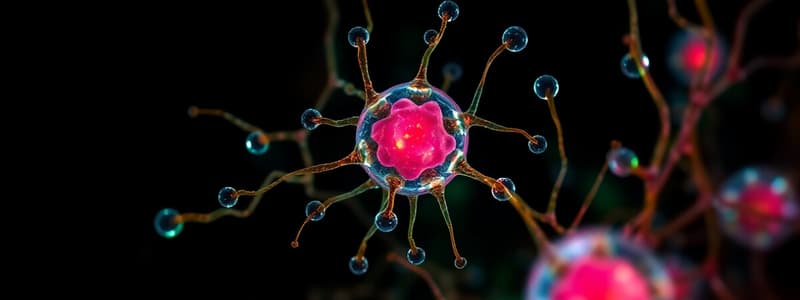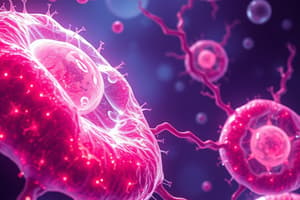Podcast
Questions and Answers
What is the primary role of self-renewal in stem cells?
What is the primary role of self-renewal in stem cells?
- To maintain the stem cell pool (correct)
- To enable stem cells to specialize
- To create tissue-specific cells
- To repair damaged tissues
Which of the following describes a characteristic of differentiated cells?
Which of the following describes a characteristic of differentiated cells?
- They remain undifferentiated
- They can divide to produce stem cells
- They have specialized functions (correct)
- They are found only in embryos
What is a stem cell niche?
What is a stem cell niche?
- A type of specialized cell
- A stage of embryonic development
- A process of cell specialization
- A microenvironment that supports stem cells (correct)
Which type of stem cells can be found throughout a person's life?
Which type of stem cells can be found throughout a person's life?
Which of the following statements about differentiation is true?
Which of the following statements about differentiation is true?
What type of stem cells can differentiate into all specialized cell types in the body except for those contributing to the placenta?
What type of stem cells can differentiate into all specialized cell types in the body except for those contributing to the placenta?
Which stem cell type can contribute to the formation of the placenta and umbilical cord during embryo development?
Which stem cell type can contribute to the formation of the placenta and umbilical cord during embryo development?
Which of the following best describes the potency of tissue stem cells?
Which of the following best describes the potency of tissue stem cells?
What is a primary challenge faced by embryonic stem cells?
What is a primary challenge faced by embryonic stem cells?
Where are embryonic stem cells predominantly found during early development?
Where are embryonic stem cells predominantly found during early development?
What is cellular differentiation primarily responsible for?
What is cellular differentiation primarily responsible for?
What term describes the process by which different cell types form organized structures in an organism?
What term describes the process by which different cell types form organized structures in an organism?
Which type of stem cells are derived from embryos?
Which type of stem cells are derived from embryos?
What mechanism leads to different cells expressing different genes?
What mechanism leads to different cells expressing different genes?
Which of the following is NOT a source of stem cells?
Which of the following is NOT a source of stem cells?
What is a potential application of stem cells?
What is a potential application of stem cells?
What critical aspect of differentiation allows for tissue repair in adults?
What critical aspect of differentiation allows for tissue repair in adults?
Which of the following ethical issues is associated with stem cell research?
Which of the following ethical issues is associated with stem cell research?
What process involves removing the nucleus from an egg cell and replacing it with a donor nucleus?
What process involves removing the nucleus from an egg cell and replacing it with a donor nucleus?
What is a significant ethical concern associated with somatic-cell transfer in human cells?
What is a significant ethical concern associated with somatic-cell transfer in human cells?
What are cloned individuals created through reproductive cloning considered to be?
What are cloned individuals created through reproductive cloning considered to be?
What is the primary goal of therapeutic cloning?
What is the primary goal of therapeutic cloning?
What is a common use of stem cells in regenerative medicine?
What is a common use of stem cells in regenerative medicine?
Which of the following best describes somatic-cell transfer?
Which of the following best describes somatic-cell transfer?
Which is a legal limitation often associated with the use of embryonic stem cells?
Which is a legal limitation often associated with the use of embryonic stem cells?
Which characteristic is unique to tissue stem cells compared to specialized cells?
Which characteristic is unique to tissue stem cells compared to specialized cells?
Where can tissue stem cells be found according to the provided information?
Where can tissue stem cells be found according to the provided information?
What type of cells can hematopoietic stem cells (HSCs) specialize into?
What type of cells can hematopoietic stem cells (HSCs) specialize into?
Which of the following describes the function of tissue stem cells?
Which of the following describes the function of tissue stem cells?
What distinguishes tissue stem cells from committed progenitor cells?
What distinguishes tissue stem cells from committed progenitor cells?
Which of the following statements best defines 'self-renewal' in the context of stem cells?
Which of the following statements best defines 'self-renewal' in the context of stem cells?
How do 'transient amplifying cells' differ from tissue stem cells?
How do 'transient amplifying cells' differ from tissue stem cells?
Which of the following types of cells can be produced directly from tissue stem cells?
Which of the following types of cells can be produced directly from tissue stem cells?
Flashcards are hidden until you start studying
Study Notes
Stem Cell Biology
- Stem cells are undifferentiated cells that can divide and differentiate into specialized cells.
- Stem cells have two main properties:
- Self-renewal: Stem cells can produce more stem cells, maintaining the stem cell pool
- Differentiation: Stem cells can become specialized cells with specific functions, replacing dead or damaged cells
- Stem cells are found in various sources:
- Embryonic stem cells: Pluripotent, found in the inner cell mass of a blastocyst (early embryo)
- Tissue stem cells: Multipotent, found in various tissues throughout the body and maintain tissue homeostasis
- Induced pluripotent stem cells: Pluripotent cells derived from adult specialized cells by reprogramming
- Stem cell potency refers to the number of cell types a stem cell can produce.
- Totipotent: Can give rise to all cell types (embryonic and extraembryonic tissues)
- Pluripotent: Can give rise to all cell types in the body
- Multipotent: Can give rise to a limited number of cell types
Embryonic Stem Cells (ESCs)
- ESCs are pluripotent and can be derived from the inner cell mass of a blastocyst.
- ESCs can differentiate into all types of adult tissues.
- Obtaining ESCs requires the destruction of embryos, raising ethical concerns.
- Research with ESCs faces limitations in terms of obtaining cells and directing them to specific cell types for therapeutic use.
Tissue Stem Cells
- Tissue stem cells reside in specific tissues where they maintain tissue homeostasis.
- Tissue stem cells are multipotent and can differentiate into the cell types of the tissue they belong to.
- One example of tissue stem cells is the haematopoietic stem cells (HSCs) in bone marrow, which can differentiate into all types of blood cells.
Applications of Stem Cells
- Regenerative Medicine: Stem cell-based therapies aim to replace lost or damaged cells in diseases like Parkinson's, heart disease, and spinal cord injury.
- Drug Testing and Screening: Large numbers of identical stem cells can be used to test and screen drug candidates, which allows for efficient and consistent testing.
- Studying Disease Processes: Stem cells can be used to generate models of diseases, helping to understand their mechanisms and test potential treatments.
- Ethical Concerns: The use of embryonic stem cells raises ethical concerns.
- Regulation of Stem Cell Research: The use of embryonic stem cells is heavily regulated, with varying legislations around the world.
Studying That Suits You
Use AI to generate personalized quizzes and flashcards to suit your learning preferences.



